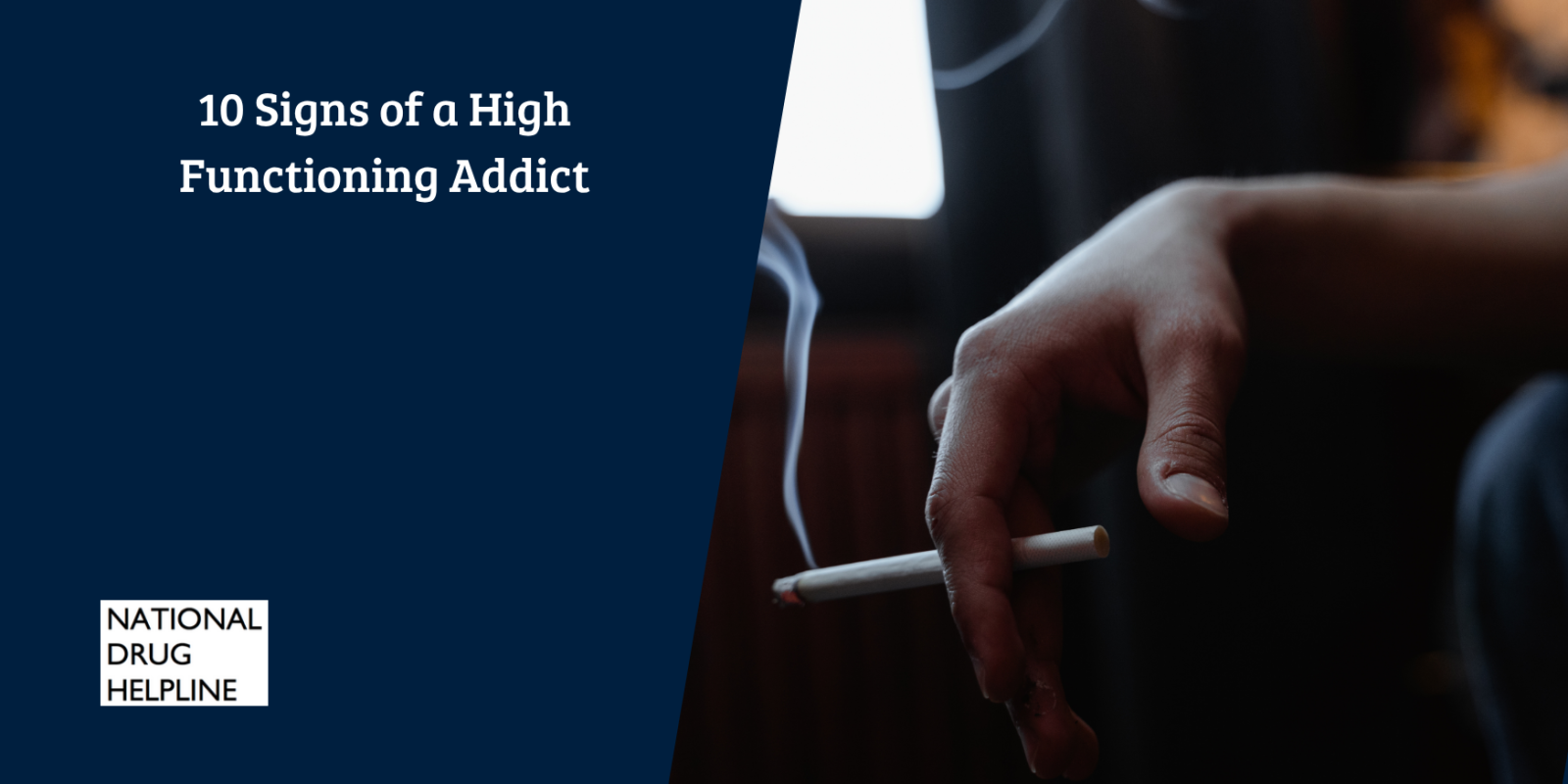A high-functioning addict is someone who may externally appear to have a normal life but may be secretly battling with addiction. They may hold normal jobs, maintain relationships, have a social circle, and may even excel professionally. But beneath this facade, their addiction affects them in all aspects of their life, including their physical health, emotional well-being, and decision-making.
As they do not fit the typical image of a person with addiction, high-functioning addicts fly under the radar. They may even be unaware of it, as they may convince themselves and others that they are in control of their addiction. However, no matter the severity or how well hidden it is, addiction is still addiction.
In order to help a high-functioning addict, it is critical to be able to identify the signs and recognize them early on.
10 Signs of a High Functioning Addict
Not everyone with an addiction is easily visible. There are ten signs of addiction
Addiction isn’t always visible. These ten signs can help identify whether someone—perhaps even yourself—might be struggling behind the scenes.
1. They Make Excuses for Their Use
A functioning addict makes excuses and often rationalizes their behavior with statements such as “I need a drink to relax after work,” or “Everyone takes something to get through tough weeks.” Over time, such rationalization becomes a regular habit.
2. They Set and Break Their Own Limits
High-functioning addicts tend to try and set boundaries, for instance, only drinking on weekends or taking just enough to get by. However, they rarely stay within the boundaries they set, which suggests a loss of control.
3. They Maintain an Appearance of Success
On the outside, they are indistinguishable from non-addicts. In fact, some high-functioning addicts may even appear to be thriving. They are on time to work, complete assignments on schedule, and are socially active. But succeeding career-wise does not imply a sound mind and health. Such people may be at a higher risk as their addiction becomes masked by their success.
4. They Experience Memory Lapses or Blackouts
In spite of their ability to function, they may have some subtle signs from the impact of addiction on their health. Some may suffer from frequent memory issues[1], such as forgetting appointments or having periods of lost time. Such signs are particularly present in people addicted to alcohol or prescription medications.
5. They’re Often Defensive or Secretive
They may get easily irritated, dismissive, or evasive when they are questioned about their habits. They may lie about where they have been or try to hide any evidence of their addiction.
6. They Prioritize Use Over Important Activities
While high-functioning addicts may engage socially, they may skip family gatherings[2], hobbies, or responsibilities. This is not because they are lazy or forgetful, but it happens because the majority of their time and energy is spent on pursuing their addiction.
7. They Justify Use Due to Stress or Success
They may be unaware that they have a problem and may give excuses or reasons to indulge, such as a hard day or a celebration. They become addicts as a reward or coping tool.
8. They Exhibit Physical or Emotional Changes
They may appear to be well-dressed and composed, but there may be subtle shifts such as increased irritability, poor sleep, anxiety, weight changes, or frequent illness. These changes suggest a deeper internal struggle.
9. They Lead a Double Life
They may disappear for periods of time without any explanation or may go out frequently. They may have two versions, one that they present to the world, and the other is a hidden version consumed by guilt, shame, or cravings.
10. They Deny There’s a Problem
As they are usually unaware or unwilling to admit that they have a problem, high-functioning addicts may be in denial[3]. They often say things like, “I am not like those people”, or “I can stop anytime.”
The Hidden Toll of Functioning Addiction
Addicts who are high-functioning may have a deceptive and dangerous life. With time, addiction takes over their life and silently damages their health, relationships, finances, and mental well-being. Apart from their personal life, they may also have to face increased risk of accidents, legal issues, and long-term consequences like organ damage or overdose.
Beating Addiction: A Path Toward Recovery
Recovery is possible, and it is never too late or too early to start. Whether you are concerned about yourself or a loved one, there are certain steps that may help ensure a lasting recovery.

Recognize the Problem
The first and bravest step is to recognize and admit that there may be a problem. Early intervention can lead to better outcomes. You do not need to hit rock bottom before you seek help.
Seek Professional Help
By seeking professional help, you may be able to find facilities that specialize in treating functioning addicts and help them balance recovery with real-life demands. They may provide treatment options such as outpatient therapy, inpatient rehab, 12-step programs, and counseling.
Identify Triggers and Patterns
Every person with an addiction has triggers and patterns that drive the urge to use. The urge may be stimulated by stress, trauma, or social situations.
Build a Support System
Recovery is not something anyone should go through alone. You can find support from family, friends, support groups, and therapists. Finding people to support you can keep you accountable and supported.
Embrace Healthy Substitutes
Exercise, mindfulness, creative hobbies, or volunteering can provide the “rush” or relief once sought through substances.
Address Co-Occurring Disorders
Many people with addiction suffer from unaddressed anxiety, depression, or trauma. Such mental health issues should be treated simultaneously to improve long-term outcomes.
Take It One Day at a Time
Recovery is not a linear path. There may be setbacks, but it is essential to know that every step forward matters. Learning to celebrate small victories, being persistent, and taking it one day at a time are key to managing addiction.
Final Thoughts
A high-functioning addict does not fit the typical picture of an addict. They may not look like what we expect, but that does not mean they are healthy or safe. Addiction affects everyone, but the way it affects a person may differ. Even those people who seem fine externally may have deeply rooted issues.
Therefore, recognizing the signs to break the cycle and taking steps forward daily can help ensure recovery from addiction. If you notice these signs, it is best not to wait for things to worsen and to begin your journey towards recovery.
References
| ↑1 | Hyman, Steven E. “Addiction: a disease of learning and memory.” American Journal of Psychiatry 162.8 (2005): 1414-1422. |
|---|---|
| ↑2 | Hosseinbor, Mohsen, Nour-Mohammad Bakhshani, and Mansour Shakiba. “Family functioning of addicted and non-addicted individuals: a comparative study.” International Journal of High Risk Behaviors & Addiction 1.3 (2012): 109. |
| ↑3 | Pickard, Hanna. “Denial in addiction.” Mind & Language 31.3 (2016): 277-299. |

